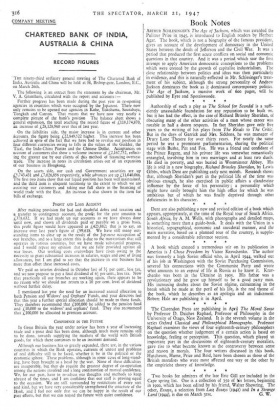Book Notes
ARTHUR SCHLESINGER'S The Age of Jackson, which was awarded the Pulitzer Prize in 1945, is introduced to English readers by Herbert Agar. The book, which is not a biography of the famous president, gives an account of the development of democracy in the United States between the death of Jefferson and the Civil War. It was a period that produced the first acute conflicts on social and economic questions in that country. And it was a period which saw the first
attempt to apply American democratic conceptions to the problems which were created by the growth of capitalist industrialism. The
close relationship between politics and ideas was then particularly in evidence, and this is naturally reflected in Mr. Schlesirbger's treat- ment of his subject, although the strong personality. of Andrew Jackson dominates the book as it dominated contemporary politics. The Age of Jackson, a massive work of boo pages, will be
published by Eyre and Spottiswoode.
* * * *
Authorship of such a play as The School for Scandal is a suffi- ciently unassailable foundation for any reputation to be built on, but it has had the effect, in the case of Richard Brinsley Sheridan, of
obscuring many of the other activities of a ran whose career was notable in half a dozen respects. In fact Sheridan gave only five
years to the writing of his plays from The Rivals to The Critic. But in the days of Garrick and Mrs. Siddons, he was manager of Drury Lane Theatre for over thirty years. For • nearly the same period he was a prominent parliamentarian, sharing the political stage with Burke, Pitt and Fox. He was a friend and confidant of the Prince Regent, and his private life was somewhat romantically entangled, involving him in two marriages and at least two duels. He died in poverty, and was buried in Westminster Abbey. His life is told in a new biography, Richard Brinsley Sheridan, by Lewis Gibbs, which Dent are publishing early next month. Research shows that, although Sheridan's part in the political life of the time was obvious enough, he also exercised in public affairs a clandestine influence by the force of his personality ; a personality which
might have easily brought him the high office for which ,he was ambitious but of which he was finally deprived through other deficiencies in his character.
* * * *
Dent are also publishing a new and revised edition of a book which appears, appropriately, at the time of the Royal tour of South Africa. South Africa, by A. M. Wells, with photographs and detailed maps, is something more than a guide-book. It deals with the Union in a historical, topographical, economic and anecdotal manner, and the main narrative, based on a planned tour of the country, is supple-
mented by a considerable reference section.
* * * *
A book which created a tremendous stir on its publication in America is I Chose Freedom by Victor Kraarchenko. The author was formerly a high Soviet official who, in April 1944, walked out of his job in Washington with the Soviet Purchasing Commission, severed his connections with the Communist Party and wrote what amounts to an exposel of life in Russia as he knew it. Krav- chenko was born in the Ukraine in 1905. His father was a
revolutionary and he grew up himself to be a good party man. His increasing doubts about the Soviet regime, culminating in the break which he made at the peril of his life, is the real theme of the book, which he describes as an apologia and an indictment.
Robert Hale are publishing it in April.
* * * *
The Clarendon Press are publishing in April The Moral Sense by Professor D. Daiches Raphael, Professor of Philosophy in the University of Otago, New Zealand. It is the seventh volume in the series Oxford Classical and Philosophical Monographs. Professor Raphael examines the views of four eighteenth-century philosophers on the question whether judgement of a certain action is based on knowledge, feeling or perception. This question, which played an important part in the discussions of eighteenth-century moralists, gave rise to what became known as the controversy between sense and reason in morals. The four writers discussed in this book, Hutcheson, Hume, Price and Reid, have been chosen as those of the British moralists Who were most affected one way or the other by the empiricist theory of knowledge.
* * * * Two books for admirers of the late Eric Gill are included in the Cape spring list. One is a collection of 35o of his letters, beginning in 1900, which has been edited by his friend, Walter Shewring. The
other, Essays, a selection from Last Essays (1942) and In a Strange Land (1944), is due on March 3ist. G. W.


































 Previous page
Previous page